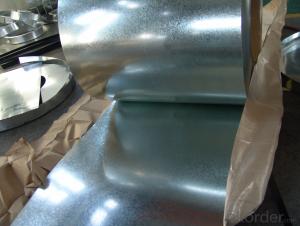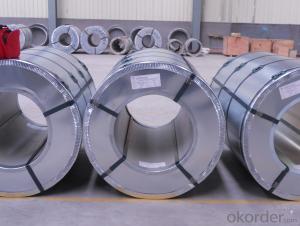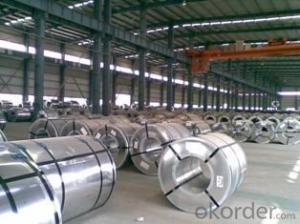Hot-dip Galvanized Steel Coils
- Loading Port:
- China Main Port
- Payment Terms:
- TT OR LC
- Min Order Qty:
- -
- Supply Capability:
- -
OKorder Service Pledge
OKorder Financial Service
You Might Also Like
Specifications:
Product name | Hot-dip Galvanized Steel Coils |
Thickness | 0.2mm-2.0mm |
Width | 900mm,914mm,1000mm,1200mm,1250mm,1500mm |
Zinc coating | 40g-275g |
Standard | ASTM, AISI, JIS, GB |
Material | SGCC,DC51D,DX51D,DX52D,SPCC,SGCD,Q195,SGHC |
Surface structure | zero spangle, regular spangle or minimum spangle |
Surface treatment | Chromate treatment, Oiled/dry, skinpassed/non-skinpassed |
Packing | Standard seaworthy export package |
Payment | T/T or L/C |
Min order | 50 ton/tons |
Delivery time | within 35 days upon receipt original L/C or advance payment |
Application
Construction | the building roof plate, roof grille etc. |
Light industry | the home appliances with its shell, civil chimneys, kitchen appliances etc. |
Automobile | corrosion resistant parts of car etc. |
Farming livestock and fishing | food storage tools; frozen processing equipment of meat and aquatic products etc. |
Commerce | storage and transportation of materials, packaging equipment etc. |
- Q:What are the different surface treatments available for steel coils?
- There are several different surface treatments available for steel coils, including galvanizing, painting, and powder coating. Galvanizing involves applying a layer of zinc to the surface of the steel to provide corrosion resistance. Painting involves applying a layer of paint to the surface to enhance its appearance and protect it from rusting. Powder coating is a process where dry powder is electrostatically applied to the steel surface and then cured under heat to form a protective and decorative coating.
- Q:How are steel coils used in the energy sector?
- Steel coils are used in the energy sector for various purposes, primarily in the construction and maintenance of power plants and transmission infrastructure. They are commonly used in the manufacturing of turbines, generators, and transformers due to their strength and durability. Steel coils are also used to fabricate pipelines and storage tanks, which are essential for transporting and storing oil, gas, and other energy resources. Additionally, steel coils play a crucial role in the construction of wind turbines, providing support and stability to these renewable energy sources.
- Q:How are steel coils used in the manufacturing of packaging materials?
- Steel coils are used in the manufacturing of packaging materials as they provide strength and stability to the packaging structure. They are commonly used as a core material for packaging tubes, enabling them to withstand heavy loads and prevent deformation. Additionally, steel coils are utilized in the production of steel straps, which are widely used for securing packages and pallets, ensuring safe transportation and storage of goods.
- Q:Can steel coils be coated with chemical-resistant materials?
- Yes, steel coils can be coated with chemical-resistant materials. The use of chemical-resistant coatings helps protect the steel coils from corrosion and damage caused by exposure to various chemicals, acids, or solvents. These coatings create a barrier that prevents the chemicals from reaching the steel surface and ensure the durability and longevity of the coils in harsh chemical environments.
- Q:What are the different methods of coil welding for steel coils?
- Steel coils can be welded using various methods, each with its own pros and cons. The following are some commonly used techniques: 1. Resistance Welding: In this method, an electric current is passed through the coils to generate heat, which fuses the ends together. It is a fast and efficient process that produces reliable welds. Industries requiring high-speed production often utilize resistance welding. 2. Arc Welding: This technique involves creating an electric arc between an electrode and the workpiece to create a weld. It can be further categorized into processes like shielded metal arc welding (SMAW), gas metal arc welding (GMAW), and flux-cored arc welding (FCAW). Arc welding offers good penetration and can be applied to a wide range of steel coils. 3. Laser Welding: Laser welding employs a high-powered laser beam to melt and join the ends of the coils. It provides precise control, high welding speeds, and minimal distortion. Industries such as automotive and electronics, which require precision and aesthetics, often rely on laser welding. 4. Induction Welding: This method involves using electromagnetic induction to heat the coils, which then melt and are pressed together to form a weld. It is suitable for thin-gauge steel coils and allows for precise control over the welding process. 5. High-Frequency Welding: High-frequency current is used to heat and weld the coils together in this technique. It is commonly used for pipes and tubes and offers high production rates and good weld quality. 6. Friction Welding: Friction welding creates a weld by generating heat through the rubbing of the coil ends. It is a fast and reliable method that produces strong joints. Industries requiring high-strength welds, such as automotive and aerospace, often employ friction welding. These are just a few of the many coil welding methods for steel coils. The choice of technique depends on factors like the steel type and thickness, required weld strength, production speed, and project requirements as a whole.
- Q:I am thinking of buying a stainless steel necklace, but I need to know if it will discolor. My brothers ring turned brown, but he forgot what kind of metal it was. Also answer if I can wear it in the shower because I wear my other necklace in it.
- I would say don't wear it in the shower because it will tarnish and it could rust.
- Q:What are the different surface finishes for steel coils?
- Some common surface finishes for steel coils include hot rolled, cold rolled, galvanized, and coated finishes. Hot rolled coils have a rougher surface and are typically used for structural applications. Cold rolled coils have a smoother surface and are often used in applications requiring a high-quality finish. Galvanized coils are coated with a layer of zinc to protect against corrosion. Coated finishes include options like painted, epoxy, or vinyl coatings, which provide additional protection and aesthetic appeal.
- Q:Steel resist tension. Then why we provide steel in compression zone ?
- There are several reasons to add compression steel. Keep in mind, supported steel (meaning it can't buckle) resists compression as well. Compression steel helps reduce long term deflections. Concrete creeps under sustained loads. Steel lessens the compression, meaning less sustained compressive stress to cause creep deflection. It makes members more ductile. Since the steel takes some of the compressive stress, the compression block depth is reduced, increasing the strain in the tension steel at failure, resulting in more ductile behavior (the moment at first yield remains largely the same with compression steel added, but the increase in capacity after yield is significant). Compression steel insures that the tension steel yields before the concrete crushes, meaning it helps change the failure mode to tension controlled. It makes beams easier to construct. With bars in the top and bottom, you have longitudinal reinforcement in all 4 corners of the shear stirrups to keep them in place when pouring the concrete. Also, for continuous members, its often easier to run your negative moment steel the full length of the beam rather than trying to cut it off in the positive moment regions. Serviceability concerns. You're going to end up putting steel in that region anyway to for temperature and shrinkage.
- Q:Can steel coils be used in the manufacturing of appliances?
- Yes, steel coils can be used in the manufacturing of appliances. Steel coils are commonly used in the production of various appliances such as refrigerators, washing machines, and stoves. The steel coils provide durability, strength, and corrosion resistance, making them an ideal material for appliance manufacturing.
- Q:for instance Cr-Ni steeldoes this refer to plated steel or a uniform mixture
- stainless steel is an alloy normally iron with additions of C, Mn, Ni, Cr, and Nb - amounts added depend on properties required. Corrosion resistance is due to a very thin but dense layer of chromium oxide which forms at the surface and prevents further attack. Ordinary steel on the other hand becomes coated with a porous layer of iron oxide(rust) through which the atmosphere can pass and cause further corrosion.
1. Manufacturer Overview |
|
|---|---|
| Location | |
| Year Established | |
| Annual Output Value | |
| Main Markets | |
| Company Certifications | |
2. Manufacturer Certificates |
|
|---|---|
| a) Certification Name | |
| Range | |
| Reference | |
| Validity Period | |
3. Manufacturer Capability |
|
|---|---|
| a)Trade Capacity | |
| Nearest Port | |
| Export Percentage | |
| No.of Employees in Trade Department | |
| Language Spoken: | |
| b)Factory Information | |
| Factory Size: | |
| No. of Production Lines | |
| Contract Manufacturing | |
| Product Price Range | |
Send your message to us
Hot-dip Galvanized Steel Coils
- Loading Port:
- China Main Port
- Payment Terms:
- TT OR LC
- Min Order Qty:
- -
- Supply Capability:
- -
OKorder Service Pledge
OKorder Financial Service
Similar products
New products
Hot products
Related keywords





























